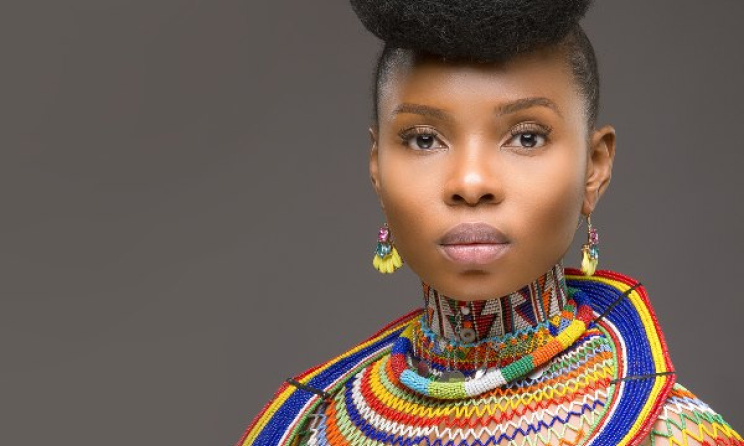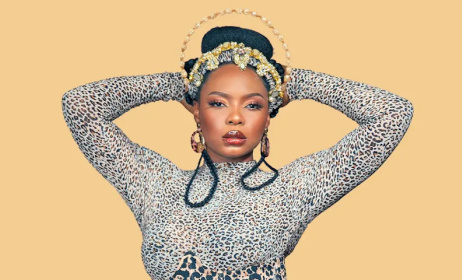Yemi Alade — Mama Africa
 Yemi Alade returns with 'Mama Africa'
Yemi Alade returns with 'Mama Africa'
If there is an award for the most undeserved title of the year, then Yemi Alade has already won. I’ll suggest she wins it every day till her next album.
That title, Mama Africa, is the name of her sophomore album, an album that has the lady feature artists from around the continent—if the continent had only eastern and western regions. How exactly has the lady who became famous as a lovelorn woman become this African Union poser? One word: 'Johnny'. That song became a hit around the continent. I recall women of different ages dancing vigorously to the song one evening in Accra.
What to do with this new found fame than to consolidate it around the continent with a self-given title?
Problem is, Ms. Alade is neither a great vocalist nor an imaginative songwriter; she is nowhere near the original Mama Africa, Miriam Makeba. An average artist through and through, Alade won millions over because she’s beautiful, relatable, energetic, and arrived with sass. She is genuinely charming. To a degree, she was and remains the epitome of the Lagos girl in the Nigerian imagination. Men want her; women like her.
That image is absent on the cover of Mama Africa, which shows an unsmiling Yemi Alade with hairdo that is clearly meant to conform to a dated idea of Africa. But of course the Ms Alade persona is a sensual, funny one. That was the persona fans around the continent connected with.
The missing sensual Yemi Alade gave us ‘Duro Timi’ and caused a steamy stir with Dipp in the video for 2012’s ‘Rock Your Body’. The funny Yemi Alade provoked the search for Johnny. The success of that song, unexpected as it was, has now made the artist and her team go after it, this time consciously. As one might go in search of a high after an accidental hit.
But the geography is as dodgy as the image is a fraud. While the album is high-mindedly subtitled, “Diary of an African woman,” a number of songs carry the specifically vapid materialism of the stereotypical Lagos girl. The flesh may scream selfless-Africa but the spirit is greedy-Lagos. There’s the luxury car required for love on ‘Ferrari’. There’s the thirst for cash on ‘Ego’: “See my baby, e name na ego” (My baby’s name is money).
These are songs having words with meanings. Other times, the album goes through the motions, employing all kinds of sounds (tumbum-tumbum, kom-kom, toronto-toronto) perhaps to avoid the trouble of actual words. Ms. Alade's pop colleagues, from Tekno to Wizkid, are not exactly different but with a lot of them there’s a crazy but hearty dedication to brainless pop. There’s too little of such commitment to be found on Mama Africa; even with the repetitive lyrics and stale beat patterns, not a single song from the 15-track album reaches the 4-minute mark. The studio is a 3-minute stopover on Ms Alade’s trip to the shopping mall.
The result is an album that is often weak when Ms Alade is alone. Paired with a colleague, she raises her game; the album, too, comes to sound better than it is overall. These are all male collaborators. As with Tiwa Savage on the RED album, Yemi Alade doesn’t play with girls.
Flavour delivers on ‘Kom Kom’. Ditto Sarkodie on ‘Ego’—which has a single phrase repeated ad nauseam on a ravishing beat produced by the brilliant Masterkraft. I’m not so sure of the Sauti Sol-assisted hit ‘Africa’ which has a recycled “African beat” with hints of dancehall and lines praising the limbs of Africa: “My Kenyan legs will run to you…” There you have it: clichéd African tourism brought to you by athletes disguised as popstars. Yet, the banality of 'Africa' is matched by 'Do As I Do' featuring DJ Arafat, the coupé-décalé man who seems to have made quite the career from shouting.
To be sure, there’s some pleasure on Mama Africa—notably on the chorus of ‘Nakupenda’. But too much of Yemi Alade’s second album has zero replay value. If the diary of an African woman reads this vacuously, then it should be chucked through the highest window of a skyscraper.



























Commentaires
s'identifier or register to post comments